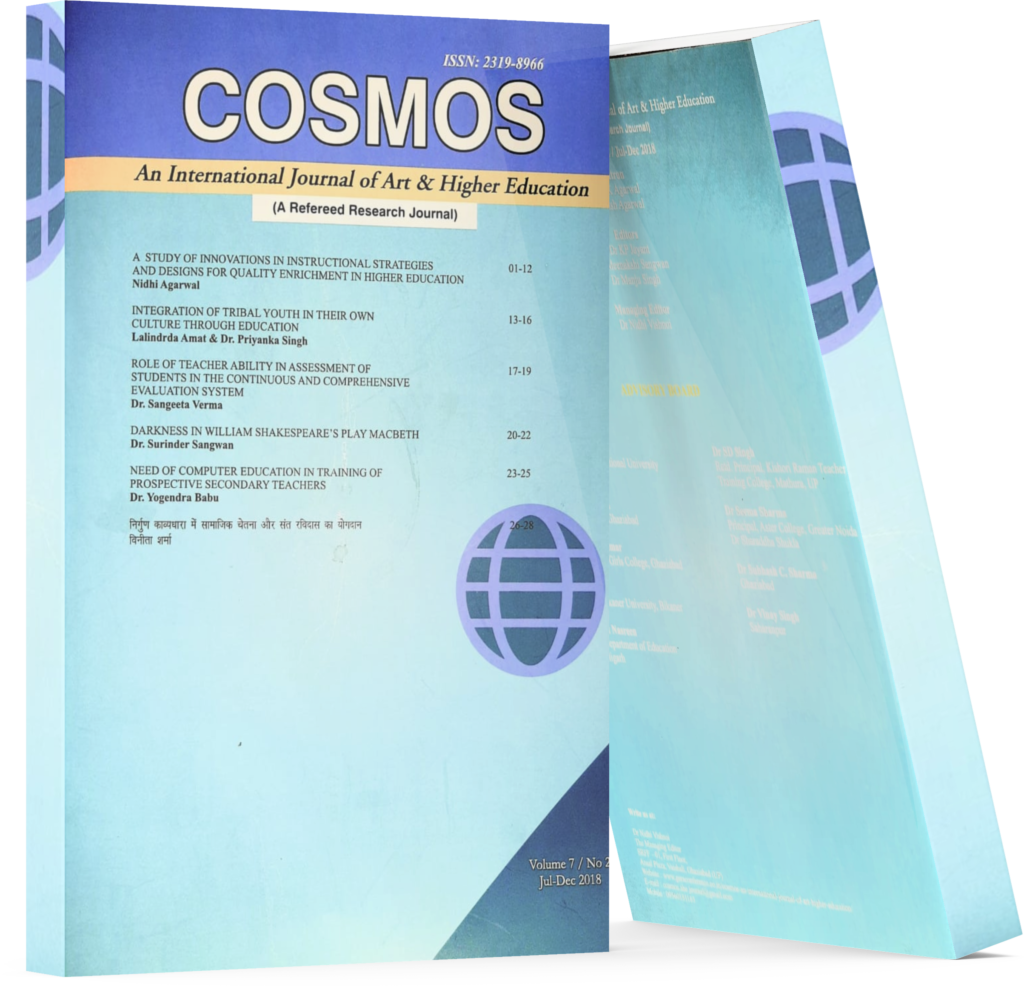Sustaining A Viable Education System In Nigeria: The Role Of Formative Assessment And Feedback
Keywords:
Education System, Feedback, Formative Assessment, Nigeria.Abstract
The paper discussed the role of formative assessment and feedback in the Nigeria education system. First, the approaches to, and the principles of formative assessment were discussed. Second, the types; the importance; the stages, and the features of effective feedback were also highlighted. The paper further concluded that every learning endeavour needs formative assessment and feedback at one point or the other; to ascertain the level of progress made by all involved. Finally, the paper suggested that teachers provide a timely and regular formative assessment, and feedback to students; be professionally trained in the art and science of giving feedback to learners; be provided with formative assessment and feedback tools and officials of the education ministries at the federal, state and local governments, should give the guidelines for formative assessment and feedback of students to teachers and schools, and ensure strict compliance.
Downloads
References
Ainsworth, L. & Viegut, D., (2006). “Common formative assessments”. Thousand Oaks, CA: Corwin Press.
Black, P. & Wiliam, D., (2004). “The formative purpose: Assessment must first promote learning”, In M. Wilson (Ed.), Towards coherence between classroom assessment and accountability. Chicago: University of Chicago Press.
Brookhart, S.M., (2008). “How to Give Effective Feedback to Your Students?”, Association for and Curriculum Development. Virginia, USA.
Carroll, A., Houghton, S., Durkin, K., & Hattie, J., (2001). “Reputation enhancing goals: Integrating reputation enhancement and goal setting theory as an explanation of delinquent involvement”. In F. Columbus (Ed.), Advances in psychology research (Vol. 4, pp. 101-129). New York: Nova Science.
Clariana, R.B., Wagner, D., & Roher Murphy, L.C., (2000). “Applying a connectionist description of feedback timing”. Educational Technology Research and Development, 48 (3), 5-21.
Cornelius-White, J., (2007). “Learner-centered teacher-student relationships are effective: A meta-analysis”. Review of Educational Research, 77(1), 113-143.
Crocker, J. and Wolfe, C.T., (2001). “Contingencies of self-worth”. Psychological Review, 108(3), 593-623.
Dinham, S., (2008). “Powerful teacher Feedback”. Synergy, 6(4).
Emeasoba, N.C., (2016). “Formative Assessment: Improving Teaching And learning Business Education in Nigerian Universities”. Nigerian Journal of Business Education (NIGJBED), 3(1), 323-335.
Erturan-Ilker, G., (2014). “Effects of feedback on achievement goals and perceived motivational climate in physical education”. Issues in Educational Research, 24(2), 152-161.
Fedor, D.B., Davis, W.D., Maslyn, J.M. and Mathieson, K., (2001). “Performance improvement efforts in response to negative feedback: The roles of source power and recipient self-esteem”. Journal of Management, 27(1), 79-97.
Harks, B., Rakoczy, K., Hattie, J., Besser, M., & Klieme, E., (2014). “The effects of feedback on achievement, interest and self-evaluation: The role of feedback’s perceived usefulness”.
Educational Psychology, 34(3), 269-290. 13. Hattie, J., & Timperley H., (2007). “The Power of Feedback”. Review of Educational Research. 77(1), 81-112. DOI: 10.3102/0034654302984 87.
Irons, A., (2008). “Enhancing learning through formative assessment and feedback”. Abbington, UK: Routledge.
Klein, W.M., (2001). “Post hoc construction of self-performance and other performance in self serving social comparison”. Society for Personality and Social Psychology, 27(6), 744- 754.
Maleki, A., & Eslami, E., (2013). “The effects of Written Corrective Feedback Techniques on EFL Students’ Control Over Grammatical Construction of Their Written English”.
Theories and Practices of Language Studies, 3(7).
Mathan, S.A. and Koedinger, K.R., (2005). “Fostering the intelligent novice: learning from errors with metacognitive tutoring”. Educational Psychologist, 40(4), 257-265.
Neda, K. and Sima, S., (2016). “Comparative Investigation of the Effects of Immediate and Delayed Error Correction on the Achievement of Male and Female Iranian EFL Learners’ Writing Skills”. International Journal of Social Science and Education, 6, 2016.
Popham, W.J., (2008). “Transformative assessment”, Alexandria, VA: Association for Supervision and Curriculum Development.
Rink, J.E. and Hall, T.J., (2008). “Research on effective teaching in elementary school physical education”. Elementary School Journal, 108(3), 207-218.
Senko, C. and Harackiewicz, J., (2005). “Regulation of achievement goals: The role of competence feedback”. Journal of Educational Psychology, 97(3), 320-336.
http://dx.doi.org/10.1037/0022-0663.97.3.320. 22. Shavelson, R.J., (2006). “On the integration of formative assessment in teaching and learning
with implications for teacher education”, Paper prepared for the Stanford Education Assessment Laboratory and the University of Hawaii Curriculum Research and Development Group.
Shute, V.J., (2008). “Focus on formative feedback”. Review of Educational Research, 78(1), 153-189.
Thompson, T., & Richardson, A., (2001). “Self handicapping status, claimed self-handicaps and reduced practice effort following success and failure feedback”. British Journal of Educational Psychology, 71, 151-170.
Timperley, H.S. and Wiseman, J., (2002). “The sustainability of professional development in literacy”, Wellington: New Zealand Ministry of Education.
Van-Dijk, D. and Kluger, A.N., (2001). “Goal orientation versus self-regulation: Different labels or different constructs?”, Paper presented at the 16th annual convention of the Society for Industrial and Organizational Psychology, San Diego, CA.
Vigoda-Gadot, E. & Angert, L., (2007). “Goal setting theory, job feedback, and OCB: Lessons from a longitudinal study”. Basic and Applied Social Psychology, 29(2), 119-128. http://dx.
doi.org/10.1080/01973530701331536.
White, K.J. and Jones, K., (2000). “Effects of teacher feedback on the reputations and peer perceptions of children with behavior problems”. Journal of Experimental Child Psychology, 76, 302-326.
Winne, P.H. and Butler, D.L., (1994). “Student cognition in learning from teaching”, In T. Husen & T. Postlewaite (Eds.), International Encyclopedia of Education (2nd ed., pp. 5738-
, Oxford, UK: Pergamon.

